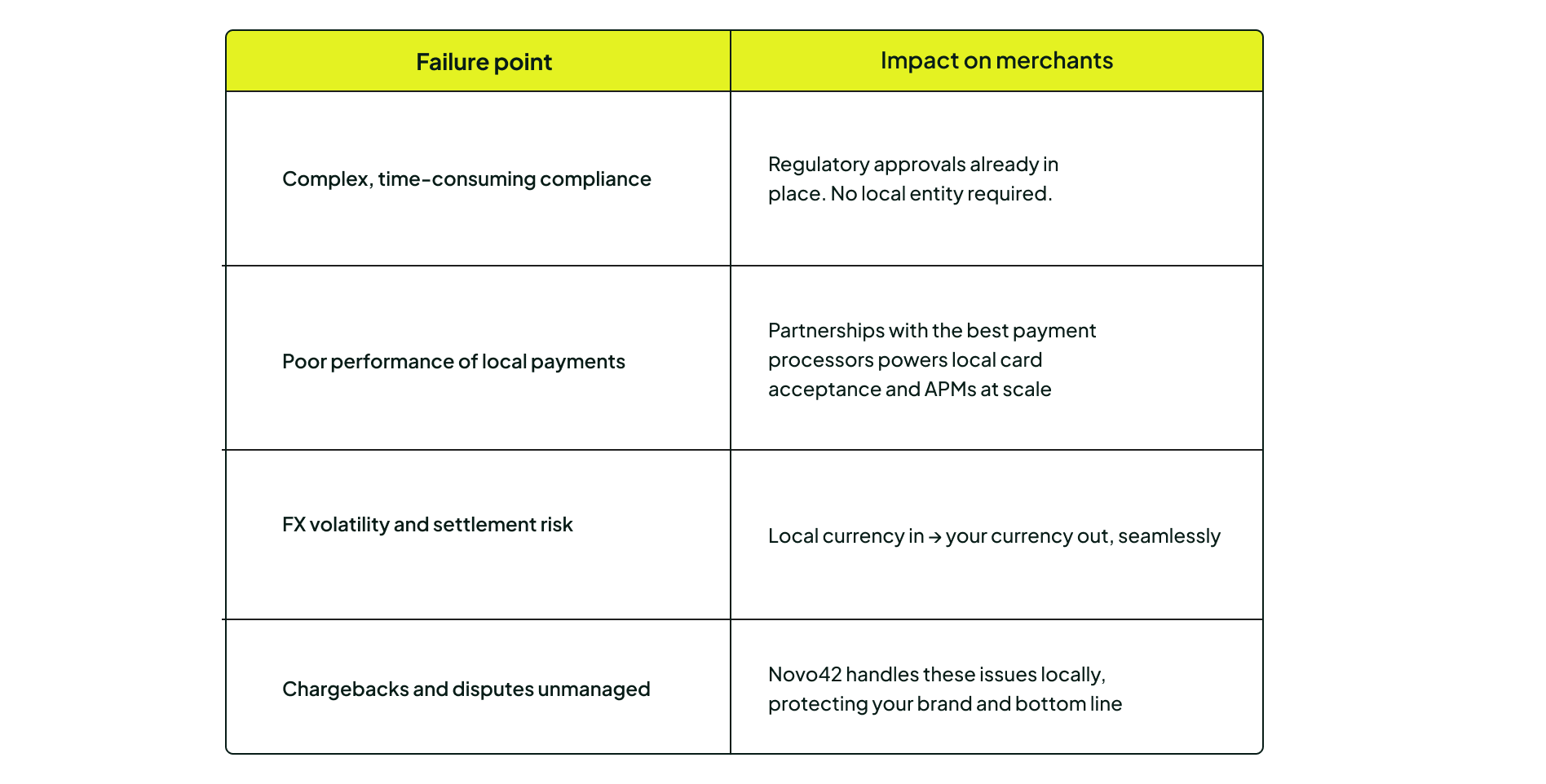Global businesses have long viewed Africa as a promising but “too risky” emerging market. Boardrooms debate whether expansion is worth the effort, and teams often deprioritise the region in favour of markets seen as more predictable.
But here’s the truth: the challenge isn’t demand, it’s execution.
Across the continent, consumers are digitally savvy, mobile-first, and eager to engage with global brands. Africa’s e-commerce market is projected to grow from ~$317 billion in 2024 to $1.017 trillion by 2033, reflecting a CAGR of 13.8%. That’s nearly double the pace of Europe (~7%) and on par with Latin America (~14%), making Africa one of the fastest-growing digital commerce regions globally.
What is missing, though, is the infrastructure to connect this demand to global businesses in a way that’s seamless, compliant, and scalable.
When merchants misread infrastructure gaps as a lack of demand, they leave billions in potential revenue untapped, and competitors who understand the market move in instead.
The myth of “risky” African markets
On paper, the opportunity is massive: Africa’s population is projected to double by 2025, mobile penetration continues to skyrocket, and markets like South Africa, Nigeria, Kenya and Egypt are becoming global leaders for fintech innovation.
Yet many global businesses de-prioritise these regions due to common misconceptions that Africa is too risky, unpredictable, or complex.
In reality, these fears are less about the markets themselves and more about the infrastructure and setup through which companies try to enter them.
When global merchants consider operating in Africa, three major pain points consistently arise:
- Regulatory complexity that feels impossible to navigate
- Fear of fraud and chargebacks damaging brand trust
- Settlement and FX headaches that create financial risk
On the surface, these challenges appear to be symptoms of a difficult, volatile market. In reality, they reflect an outdated model and a lack of local expertise.
And these dynamics aren’t unique to Africa. Even offshore markets like Turkey, for example, present similar hurdles, with sudden regulatory shifts, currency instability, and payment restrictions often cited by merchants as reasons for failed launches. The difference is that Africa’s scale and growth trajectory make these infrastructure challenges too costly to ignore.
To understand why, let’s break down how these barriers show up in four high-growth markets - South Africa, Egypt, Nigeria, and Kenya - and what they mean for global businesses.

These patterns show that challenges are not evenly distributed but shaped by each country’s mix of regulation, payment behaviour, and currency environment.
A strategy that works in South Africa may not be effective in Kenya, and assuming a “one-size-fits-all” approach often leads to failed launches.
Businesses that plan with market nuance in mind - and adapt their infrastructure accordingly - are the ones that capture growth.
Why market entry fails: four common failure points
We’ve noticed the same issues appear over and over in expansion strategies:

A common solution
To enable expansion, some global brands bypass localisation altogether and operate using international processing exclusively.
This means, for example, in order to subscribe to a leading streaming platform, a South African customer must have a debit or credit card enabled for international transactions.
It’s an approach with significant blind spots.
Most banked South Africans can’t use their debit cards for international payments, as these are switched off by default.
Those who can pay end up penalised with additional bank fees on every foreign transaction – in South Africa, this is 2% of the transaction value.
And for merchants, the costs add up quickly: higher interchange, double FX spreads, unnecessary declines, chargebacks, and hidden fees that make true performance hard to measure.
The good news is that global brands don’t need to incorporate locally to avoid these issues. There’s another way.
The proven solution: Merchant of Record (MoR)
There’s a proven path that removes this friction entirely: the Merchant of Record model.
Novo42 acts as your Merchant of Record, becoming the legal seller in-market. This means we take on the regulatory, financial, and operational complexity so you don’t have to build a local entity or in-country compliance teams.
Here’s what that looks like in practice:

Using an MoR model isn’t just a workaround, it’s expansion-grade infrastructure built specifically for high-friction markets like Africa.
Speed and scale: why MoR wins
In fast-moving markets, speed matters just as much as compliance. The right infrastructure accelerates growth. Novo42’s Merchant of Record model enables global merchants to enter Africa quickly, scale seamlessly, and operate without unnecessary risk.
Here’s how it transforms market entry:
- Faster time to market: Go live in weeks, not quarters with Novo42 as your local partner and our extensive set of partner global PSPs.
- Higher payment success rates: Unlock customers who want to pay but can’t due to international card blocks or missing local methods
- Reduced risk: Novo42 absorbs chargeback, FX, and compliance risk, so your teams don’t have to
Key takeaways for global merchants
Global merchants lose billions every year because they mistake infrastructure friction for market risk. In truth, African markets are full of growth potential with the right foundation and local partnerships in place.
By skipping local entity setups with a compliant MoR model, you’re able to offer local payment methods that match how people actually pay and ensure clean and predictable settlement without FX or treasury headaches.
Novo42 delivers all this as an all-in-one solution for compliance, payments and FX.
Merchants operate in their preferred currency, while customers pay in theirs.
With Novo42, you can turn Africa’s complexity into your competitive advantage and enter new markets quickly, compliantly, and with confidence.



